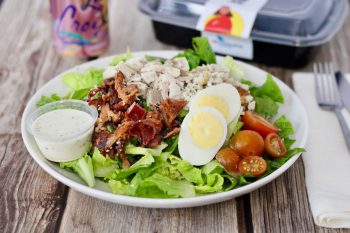Our expert, Annie Deadman, explains how a better menu could be key to a happier you.
If you only read one of my columns ever, make it this one. How you fuel your body will have a direct impact on your mood. And then an improvement in your health and energy levels will follow.
There’s so much to say on this topic that I got myself into a lather and had to pace up and down for half an hour to collect my thoughts.
I’m going to plant three words in your mind. Gut. Mood. Body. We’re going to start with a case study. Let’s take Susan. She’s 53, works full-time, and has two boys in their late teens. She has a busy husband, who also works full-time.
The onus on life and house admin generally falls to Susan. She’s frazzled, so evening meals are quick and often pasta-based (the white stuff, the boys don’t do anything ‘brown’).
The rest of her diet is given over to bowls of cereal, orange juice (‘It’s fruit, isn’t it?’), sandwiches and crisps for lunch and, occasionally, something with the word ‘lentil’ written on the pack.
She arrives home each evening tired, and the only thing that calms her is the half bottle of Chardonnay and squares of (milk) chocolate. Her sleep is sporadic (toilet trips, snoring), and she has heart palpitations and a delightful river of sweat down her cleavage every night.
While the palpitations and the sweating may largely be due to the hormonal changes of menopause, the rest of Susan’s discomfort and exhaustion is also hormonal.
The emphasis on white carbs and sugary foods in her diet means a lot of insulin production. The more insulin we produce, the more we crave the carby, sugary food, and the more frequent the sugar crashes.

Image credit: Unsplash
The response of other hormones to this creates yet more turbulence and means Susan faces each day feeling grouchy and cantankerous. If she flattened those curves a little, then Susan’s mood (and life) would regain some balance.
‘An upturn of inner health will radiate out’
What’s the plan? Well, the gut has a strong connection with the brain, and therefore keeping that in good shape will boost her spirits, energy and improve her general well-being. An upturn of her inner health will radiate outwards, and Susan’s skin, hair and nails will also start to reap the benefits.
How? It’s important to focus on eating a diverse range of vegetables, nuts and seeds each week – this will maximise vitamin and mineral uptake, as well as fibre. The more fibre we have, the more we’re feeding those lovely gut microbes.
Next up, is protein. Among other things, it fills us up, stops sugar cravings and helps slow down the absorption of sugar in the blood. It also helps keep our mood stable and calm.
Let’s fill our boots with a range of plant- and animal-based products – dairy, fish, eggs, soy products, chicken, beans, and pulses.
If Susan was to start her day with a big bowl of high-protein yoghurt, fruit, almonds or an omelette, she would breeze through her conference calls, the tussle with her boss, the tricky situation with her children, and be able to empty her inbox all without snarling or feeling remotely hungry.

Image credit: Unsplash
Cutting down on sugary and processed foods, and eating more protein along with a more diverse range of vegetables every day, means your mood, body, gut and skin will radiate happiness. And so will your family.
✣ Annie is a fat-loss and fitness coach, and creator of The Blast Plan, which is an online programme of exercise and nutrition guidance aimed at midlife women. Follow her on Instagram @anniedeadman for health tips and lots of laughs too.
ALSO SEE: Why is breakfast the most important meal of the day?
Feature image: Unsplash
Originally published in the June issue of SA Woman&Home Magazine.

